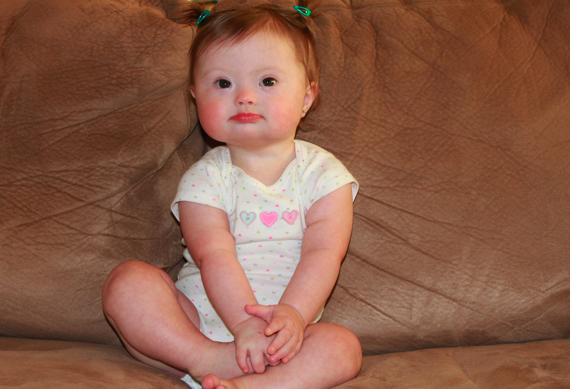It’s common knowledge within the pro-life movement that unborn babies with Down syndrome and other disorders are routinely targeted for abortion. Studies have found about 90 percent of unborn babies who test positive for Down syndrome are aborted, LifeNews previously reported. However, new research indicates that some of these tests may be wrong.
In their earliest stages of life, unborn babies’ bodies have the amazing ability to repair and replace abnormal cells with healthy ones, according to a new study from the University of Cambridge, the Daily Mail reports. The phenomenon may explain why some unborn babies who test positive for genetic disorders like Down syndrome early in pregnancy later are born healthy.
Specifically, the chorinoic cillus sampling (CVS), which tests an unborn baby’s cells in the placenta between the 11th and 14th weeks of pregnancy, may not give women an accurate picture of their unborn baby’s health, according to the report. At this stage, unborn babies could test positive for genetic disorders, but, because of their body’s repairing mechanisms, could be born without any problems.
This situation occurred with Professor Magdalena Zernicka-Goetz, author of the study. According to the report, Zernicka-Goetz had a CVS test when she was pregnant with her second child at age 44. The test showed that as many as one quarter of her unborn son’s cells could be abnormal. Months later, however, her son Simon was born healthy, the report states.
Though Zernicka-Goetz did not mention abortion specifically, she was troubled that pregnant mothers face “a difficult choice … based on a test whose results we don’t fully understand.”
“What does it mean if a quarter of the cells from the placenta carry a genetic abnormality – how likely is it that the child will have cells with this abnormality, too?” she said. “This is the question we wanted to answer.”
Follow LifeNews.com on Instagram for pro-life pictures and the latest pro-life news.
The report explains more about the research:
In the research, which was funded by the Wellcome Trust, Professor Zernicka-Goetz and her team developed a mouse model of aneuploidy – where some cells in the embryo contain an abnormal number of chromosomes.
To do so they mixed eight-cell stage mouse embryos in which the cells were normal, with embryos in which the cells were abnormal.
In embryos where the mix of normal and abnormal cells was half and half, the researchers noted that the abnormal cells within the embryo were killed off by ‘apoptosis’, or programmed-cell death, even when placental cells retained abnormalities.
This allowed the normal cells to take over, resulting in an embryo where all the cells were healthy.
When the mix of cells was three abnormal cells to one normal cell, some of the abnormal cells continued to survive, but the ratio of normal cells increased.
Professor Zernicka-Goetz said: ‘The embryo has an amazing ability to correct itself.
‘We found that even when half of the cells in the early-stage embryo are abnormal, the embryo can fully repair itself.
‘If this is the case in humans too, it will mean that even when early indications suggest a child might have a birth defect because there are some, but importantly not all abnormal cells in its embryonic body, this isn’t necessarily the case.’
Zernicka-Goetz did not say whether a new test being touted in the UK as a safer alternative to amniocentesis could have the same problems. The UK National Screening Committee recently began promoting the new non-invasive prenatal blood test (NIPT), which works by analyzing fragments of the unborn baby’s DNA in the mother’s blood. Women can be given the test when they are 11 to 14 weeks pregnant, similar to the CVS test.
The study’s troubling results are just one piece of a larger problem involving the discrimination of people with disabilities. The test results should not matter. Whether the unborn child has a disability or not, that child is still a valuable human being who deserves to live. In the past few decades, our culture has come a long way toward respecting and valuing people with disabilities. But while there has been a lot of positive media attention and advocacy for people born with disabilities, the same cannot be said for the unborn.








